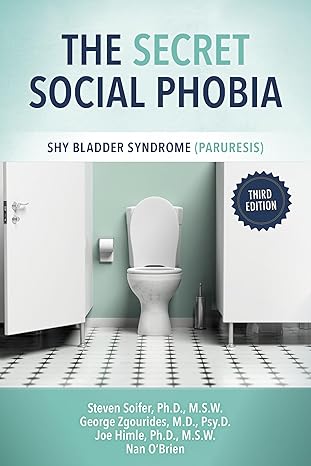Drug Treatments for Paruresis
Introduction
[The following information is taken from “The Secret Social Phobia: Shy Bladder Syndrome (Paruresis)” (3rd edition: Appendix H). We know this is a very popular page as many sufferers hope for a “magic pill” that will make the condition disappear. The IPA’s position is that a consistent program of graduated exposure is the most important element in recovery. Medications may assist you physically or mentally in preparing to be ready for that work. It is essential that you work hand-in-hand with your medical and mental health professional to overcome paruresis. Establishing a relationship with a medical professional includes divulging the secret of paruresis and often educating them. The thought of reaching out for medical help with Shy Bladder Syndrome is a daunting proposition; relaxation techniques and cognitive restructuring can help. Sometimes, even after you summon the courage to talk to a doctor, they do not respond favorably. If this happens, you must remind yourself that not all doctors are the same; they are people, too. Do not waste your time if you have trouble communicating with the medical provider you have found. Move on. Tell the next provider you need to seek another physician because a previous medical provider did not listen to or take you seriously. Let them know upfront that you expect respect, that you are seeking help, and that you are your healthcare advocate. Take control of your paruresis, and it will cease to control you.]Current theory about paruresis indicates it includes a psychological inhibition about voiding that may lead to dysfunctional control of the bladder and its sphincters. If drugs can help, they will work in one of two ways: 1) by reducing fear or inhibition, often combined with general sedation and depression of the central nervous system; 2) by acting directly on the bladder and/or its sphincters via the autonomic (involuntary) nervous system. Therefore, the drugs listed below are given under two broad headings: Anxiolytics and Urological Medicines. Those are not necessarily pharmacological categories. A further category of drugs known to cause urine retention is given under Drugs To Avoid. A few herbal supplements with known effects on physical or mental processes common to paruresis are listed under Herbal Remedies. The purpose of providing this information is not to give advice on choosing a medication, rather it is intended to help you understand the effects drugs may have on your paruresis. Once you know this information, it can be helpful in working with your doctor to choose medications appropriately if you need treatment for an unrelated condition or as an aid in a doctor-supervised treatment program for your paruresis.
Please note: This article is not medical advice. It represents only the experience of certain individuals who have paruresis. Your medical doctor is the only one qualified to prescribe or suggest drug therapies which might be beneficial to you.
There are no clinical studies indicating any drug is effective in treating paruresis if used alone. Based on anecdotal evidence, IPA believes the best approach is to combine a drug with cognitive-behavioral therapy and/or support group work under a doctor’s supervision.
For more discussion of drugs, please see our Frequently-Asked Questions topic on medication and our IPA Talk Forum.
Anxiolytics
Urological Medicines
Drugs to Avoid
Most antihistamines are related to a class of drugs used for anesthesia or sedation. These drugs are anticholinergic* and can lead to urinary retention as a side effect.
Any noradrenergic** medicine (e.g., Effexor, maybe Wellbutrin, Strattera) as well as anticholinergic medicines (many of which are also noradrenergic, e.g., tricyclics such as imipramine, clomipramine, nortriptyline or anticholinergic meds used to treat stomach problems) can cause urinary hesitancy as a side effect, though the degree to which this can happen is highly variable.
In general, any drug listing urinary retention or hesitancy as a side effect should be used carefully or avoided if a person has paruresis.
*anticholinergic: opposing or blocking the physiological action of acetylcholine (a neurotransmitter which stimulates contraction of the bladder wall – detrusor muscle)
**noradrenergic: liberating, activated by, or involving norepinephrine in the transmission of nerve impulses. Norepinephrine is both a neurotransmitter in the sympathetic nervous system and a precursor of epinephrine (adrenaline), a hormone released during the body’s response to stress or fear.
Herbal Remedies
Several herbal remedies purport to have effects on one’s mood or the urinary system. While trying these remedies may provide positive results, IPA has not heard of any reports where they have been particularly helpful. Once again, these substances should be tried only at your own risk under the advice of a doctor. A common problem with herbal remedies is that the dosage isn’t well controlled, so products from different manufacturers may have differing concentrations of the active substances. Concentrations may also vary between batches from the same manufacturer.
QUICK LINKS
INTERNATIONAL PARURESIS ASSOCIATION
P.O. Box 21237
Catonsville, MD 21228
You Are Not Alone.
There Is Help For You!
Shy Bladder, Bashful Bladder, Pee Shy
IPA OFFICE HOURS
Monday - Friday
10:00am - 6:00pm (ET)
844-I-CANT-PEE (422-6873)
US/Canada
443-315-5250 Office
Email: getinfo@paruresis.org
This website is NOT a substitute for medical or legal advice and does not constitute the practice of law, medicine, psychiatry, clinical psychology, clinical social work, or any other mental health profession. If you are having trouble urinating, you should always contact a physician since difficulty with voiding can be a symptom of a serious medical condition. We are a group of professional people and people who have suffered with paruresis. We have assembled a board and a board of advisors to help people cope with urinary dysfunction that has a psychological or social origin. On this website, we are NOT practicing medicine, psychiatry, clinical psychology, clinical social work or any other mental health profession. You should have your doctor evaluate your condition before diagnosing yourself, and seek the appropriate necessary mental health counseling if warranted. IPA, Inc. disclaims any and all legal liability whatsoever. Use of the term “member” or “membership” refers to donors above $100 each July 1 to June 30 period and does not convey any legal or ownership rights in IPA.




